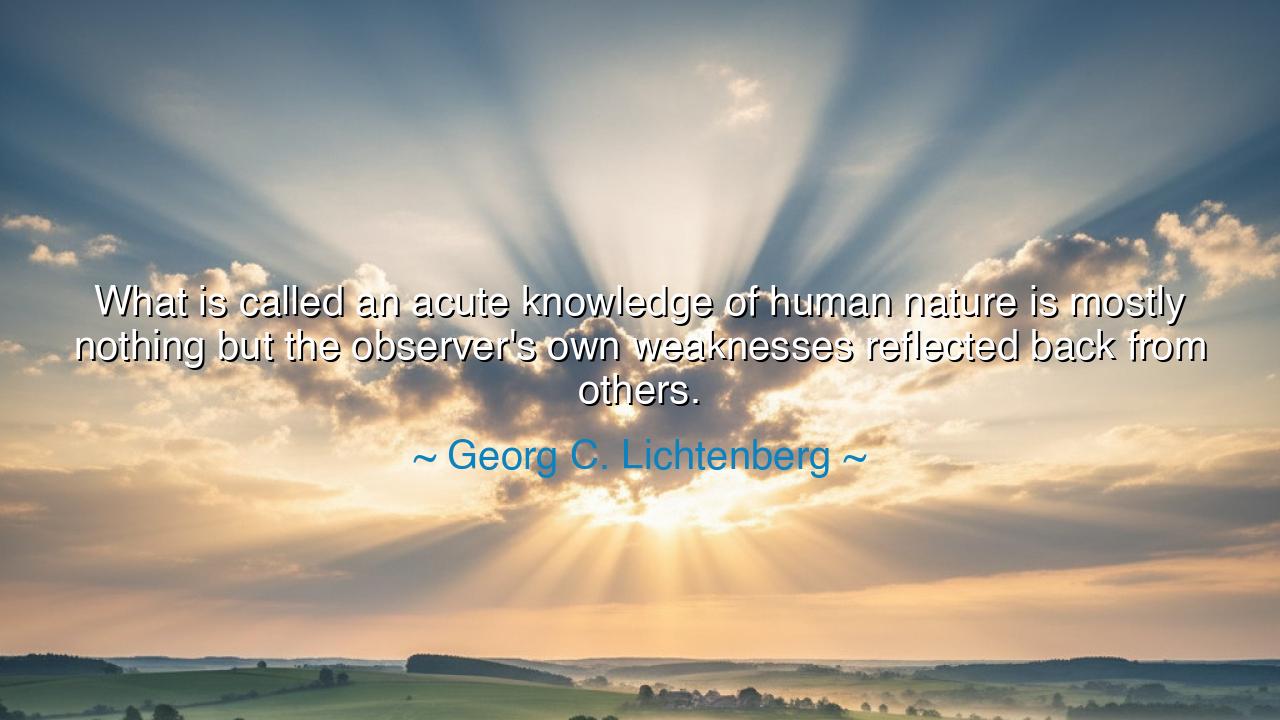
What is called an acute knowledge of human nature is mostly
What is called an acute knowledge of human nature is mostly nothing but the observer's own weaknesses reflected back from others.






The philosopher Georg C. Lichtenberg, with the keen insight of one who understood both man and mirror, once wrote: “What is called an acute knowledge of human nature is mostly nothing but the observer’s own weaknesses reflected back from others.” These words pierce deeply into the human heart, revealing a truth that humbles even the wisest: that often, when we claim to “understand” others, we are merely seeing our own faults refracted through their lives. It is a statement both psychological and spiritual, a reminder that self-knowledge is the foundation of all true wisdom.
The origin of this thought springs from the ancient recognition that man sees the world not as it is, but as he is. Lichtenberg, a German thinker of the Enlightenment, observed with a scientist’s mind and a poet’s soul that perception itself is never pure — it is colored by experience, bias, and hidden emotion. When one calls himself an expert in human nature, it is often not empathy that drives his insight, but projection. He mistakes his own shadows for the shadows of others. In the end, the window through which he looks upon mankind is but a mirror disguised.
This truth has echoed across the ages. The wise in every generation have warned that judgment reveals the judge more than the judged. The proud see pride everywhere; the deceitful see deceit in others; the fearful imagine malice in every smile. It is not the world that is dark, but the lens through which they behold it. Thus Lichtenberg’s words stand as both warning and invitation — a warning against the arrogance of self-assured perception, and an invitation to turn the gaze inward, to cleanse the mirror of the soul before one claims to read the hearts of men.
Consider the story of Socrates, the philosopher who was said to be the wisest of all men because he alone admitted he knew nothing. While others boasted of understanding their fellow citizens — their motives, their ambitions, their flaws — Socrates questioned endlessly, not to expose others, but to uncover himself. His dialogues were mirrors, showing his listeners not who others were, but who they were. And for this reason, his wisdom outlived empires. He knew what Lichtenberg later affirmed: that self-knowledge is the key that unlocks true understanding of others.
The observer’s own weaknesses, when left unexamined, turn into filters that distort the truth. A man who has not faced his envy will see corruption where there is only success. One who has not faced his insecurity will call another arrogant. The critic who prides himself on “knowing people” may simply be describing himself in secret. In the stillness of honest reflection, we begin to see that our opinions of others are rarely about them — they are the language of our own wounds speaking aloud.
Yet there is redemption in this realization. Once we understand that our perception is clouded by our inner storms, we can begin to purify the heart. We can learn to look upon others with compassion instead of projection, with understanding instead of assumption. The one who sees his own weakness clearly becomes slow to condemn, gentle in correction, and wise in silence. For he has learned the sacred art of seeing without judging, of discerning without despising. This is the beginning of humility — and humility, as all the ancients taught, is the first step toward wisdom.
Let the lesson of Lichtenberg’s insight, then, be carved upon the mind: do not rush to declare that you know the hearts of men. Before you analyze another’s failings, ask what part of your own spirit they reflect. When you feel judgment rise, let it turn to self-inquiry; when you believe you see through others, ask whether you have yet seen through yourself. Only the one who conquers his own illusions can see clearly the truth in others.
And so, my child of thought, remember this: the mirror of the world reflects the soul that gazes upon it. Cleanse that mirror with honesty and grace, and you will see not your weakness in others, but the divine spark that unites all mankind. To know human nature, first know your own. To master the world, first master the heart. For wisdom begins not with seeing others clearly — but with seeing oneself without deceit.






AAdministratorAdministrator
Welcome, honored guests. Please leave a comment, we will respond soon